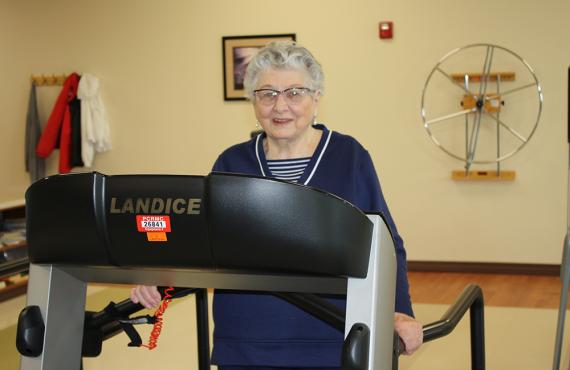Published on March 8, 2024

Read Time: 4 Minutes
Three Things to Know
- Colonoscopies allow providers to visually examine your colon for polyps and remove them, if necessary. This procedure requires sedation and bowel preparation but is considered the most effective screening method.
- Stool-based tests look for signs of cancer in stool samples collected at home. While less invasive than colonoscopies, these tests are not as effective and may require a follow-up colonoscopy if results are abnormal.
- Talk to your healthcare provider about your risk factors and preferences to decide which screening option is best for you.
By Amy Koenig, RT(R)
Phelps Health
Colorectal, or colon cancer, is the third most common type of cancer, excluding skin cancer, in both men and women. However, the good news is that colon cancer is one of the most preventable forms of cancers.
The death rate from colon cancer has been falling for the last few decades, thanks, in part, to screenings. When caught early, colon cancer is more treatable in about 90% of people.
The US Preventive Services Task Force recommends people of average risk of colon cancer begin screening at age 45.
When it comes to colon cancer screenings, there are two main types: colonoscopies, which visually inspect your colon, and stool-based tests, which look for signs of cancer in your stool.
So, what’s the difference between the two screenings? Is one more effective than the other?
Ideally, the best colon cancer screening is the one you’re willing to do.
Colonoscopies
A colonoscopy is a procedure that allows doctors and healthcare providers to see inside your colon (large intestine) and rectum for abnormal growths called polyps. You will be sedated during this procedure, which takes place at the hospital. Because of this, you won’t feel any pain or discomfort during the procedure.
At Phelps Health, general surgeons perform this test, which uses a thin, tube-shaped device to inspect your colon. The device has a light, camera and cutting tool to take a sample of the polyp.
A colonoscopy is the gold standard for colon cancer screening. With colonoscopies, not only does your provider see your entire colon, they also can remove any polyps or precancerous growths at the same time.
If you’re at high risk for colon cancer, a colonoscopy is your only screening option.
If the results of your colonoscopy are normal, you should get regular colonoscopies every 10 years through age 75 if you’re at average risk. If you’re at higher-than-average risk, your provider may suggest that you start colonoscopies earlier and undergo the tests more frequently.
To prepare for a colonoscopy, you must follow a liquid diet and take strong laxatives to clear your bowels. Follow your doctor’s preparation instructions before screening.
If your bowels aren’t clear enough, you may have to reschedule or repeat the test later. Because you’ll be sedated for the procedure, you will need someone to drive you home.
Stool-Based Tests
If you’re at average risk for colon cancer, you can discuss with your provider about taking a stool-based test. However, stool-based tests are not as effective as colonoscopies in finding cancers and large polyps that could turn into cancer.
Stool sample tests comes in different types: multi-targeted stool DNA-based tests such as Cologuard, fecal immunochemical tests (FIT) and fecal occult blood tests (FOBT).
No preparation is needed ahead of stool-based tests. These tests require you to collect a bowel movement at home and send a sample to a lab.
The FIT and FOBT screenings look for hidden blood in your stool, which can be a sign of cancer. The DNA-based tests look for hidden blood plus DNA changes that may be caused by cancer or polyp cells.
If the results of your stool-based tests are normal, you should be screened again every 3 years. DNA tests, such as Cologuard, should be repeated annually.
If your stool-based screening comes back positive, you will work with your provider to determine next steps. Your doctor or provider will most likely recommend you undergo a colonoscopy.
Insurance
Most insurance companies will pay for routine colon cancer screenings at the recommended intervals.
If a polyp or abnormal growth is found and additional tests are ordered, those tests may not fall under screening. However, new rules for insurance went into effect in 2023 that state a colonoscopy following a positive stool-based colon cancer screening is still considered a screening.
If you’re paying out-of-pocket, stool-based tests are less expensive than a colonoscopy.
Talking with your doctor or healthcare provider can help you decide what option is best for you.
Remember, even if you’re up to date with your screenings, if you start having symptoms of colon cancer, call your healthcare provider.
Amy Koenig is the cancer screening and prevention coordinator at the Phelps Health Delbert Day Cancer Institute. Learn more about preventive and cancer screenings at phelpshealth.org/cancer-and-preventive-screenings.

